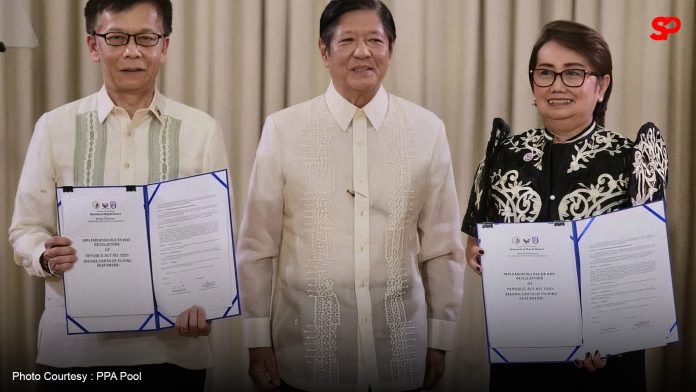MANILA – Senator Loren Legarda on Thursday expressed optimism on improved working conditions for Filipino seafarers following President Ferdinand R. Marcos Jr.’s signing of the implementing rules and regulations (IRR) of the Magna Carta of Seafarers.
Legarda, an author and co-sponsor of the landmark legislation, called the IRR signing a significant step toward safeguarding the rights and welfare of the country’s maritime workforce.
“With the IRR signed, I believe this is a huge win and boost for both foreign and domestic seafarers, as we seek decent and humane working conditions for our skilled countrymen,” Legarda said in a news release.
The Magna Carta of Seafarers, which was signed into law in September 2024, enshrines various rights and protections for around 500,000 Filipino seafarers worldwide.
It guarantees rights such as the formation of labor organizations, collective bargaining, and access to educational opportunities for career advancement.
The law also includes safeguards against harassment and discrimination, the right to inform next of kin, and guarantees for safe passage and travel.
Legarda said aligning the country’s seafaring programs with international conventions ensures that Filipino seafarers remain competitive and indispensable to the global maritime industry.
“Our seafarers are vital to sustaining the global supply chain, and we must ensure they work under conditions that uphold their dignity and rights,” she said.
The senator also acknowledged the “tremendous sacrifices” seafarers make, spending extended periods away from their families, and reiterated the government’s commitment to improving their quality of life.
“This Magna Carta is our way of showing gratitude for their hard work and dedication. It ensures that every seafarer knows their government stands behind them and is committed to enhancing their lives.”
Better legal protection
For his part, Camarines Sur 2nd District Representative Luis Raymund Villafuerte Jr. said the swift release of the IRR will provide stronger legal protections, improved training, and enhanced benefits for the nation’s mariners.
He said the signing of the IRR would ensure “full protection” for Filipino mariners in both foreign-flagged ships and Philippine-registered vessels operating overseas.
Villafuerte said it would sharpen the global competitiveness of Filipino seafarers by leveling up the country’s maritime education, training, certification and licensing system, highlighting the Philippines’ standing as the world’s largest source of sailors.
“This Magna Carta ensures greater legal and labor protection for our maritime professionals, whether on land or at sea, and better support for their families, especially in crisis periods,” said Villafuerte, one of the authors of the measure, said in a news release.
Villafuerte particularly cited provisions ensuring free legal assistance for seafarers facing disputes or violations of their contracts.
He said that under Rule 3 of the IRR, government agencies such as the Department of Migrant Workers (DMW) and the Public Attorney’s Office (PAO) will provide legal aid at no cost.
Shipowners and manning agencies are also required to inform the DMW about cases involving seafarers abroad to facilitate government support.
He further noted that in compliance with the International Labor Organization (ILO) Convention No. 190, the IRR includes measures to combat harassment and bullying on board vessels.
Shipowners must establish policies to create a safe working environment and set up helplines and grievance mechanisms to support victims.
“It is high time for the speedy implementation of this Magna Carta so we can best adhere to internationally recognized instruments such as those from the ILO and IMO (International Maritime Organization),” he said. (PNA)

